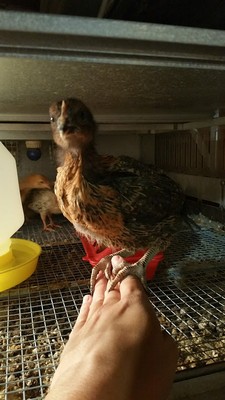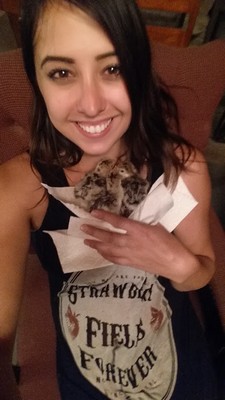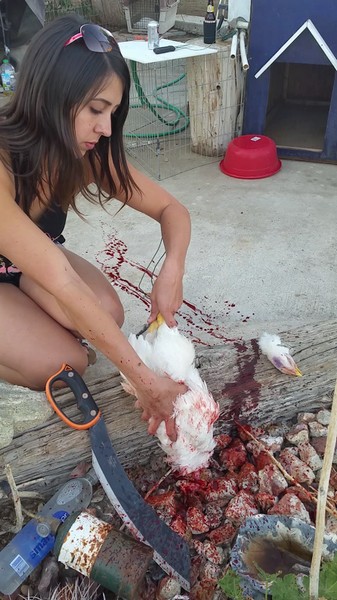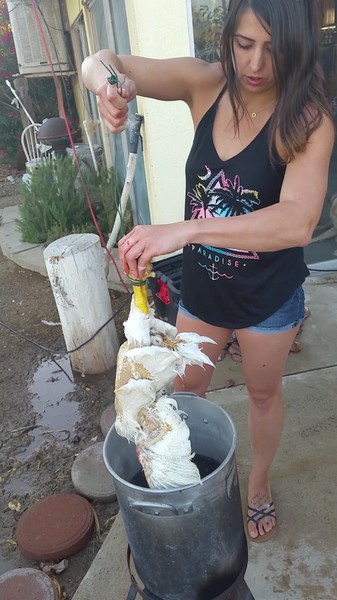A Humbling Harvest
Most people don't truly appreciate where their food comes from. Raising and harvesting your own makes you feel good about the process; while it's not always pretty, it's impossible not to respect and truly appreciate the animals. I love all animals, and I am a meat-eater. I choose to eat meat, therefore I am proud to ethically raise, fish, and also hunt for food; these methods produce truly organic meals for me, my friends, and my family. I find great pride in knowing most of what I eat have lived happy, carefree lives instead of being raised in cramped conditions possibly suffering their whole lives.
I have hunted before, but besides fishing, I have never killed an animal with my own hands. I told my boyfriend that if I could not harvest a chicken and eat it, then I didn't feel I deserved to eat meat, so it was something I wanted and felt I needed to do.
We purchased and raised broiler chickens from babies specifically for eating.
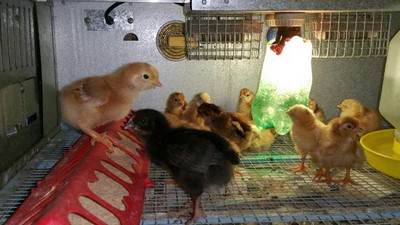
We raised them alongside the pet chickens and turkeys, held them and talked to them, and fed them treats. Both my boyfriend and I love the chickens and spend a lot of time out in the yard hanging out with the chicks, ducks, turkeys, peacocks, and the goose (he thinks he's a duck). The animals in the yard have been handled so much as babies that they are exceptionally friendly; they even wander into the house after us if the door is left open to the patio.
I love animals of all sorts: birds, reptiles, dogs, horses, etc. (except for house cats... they and I should not exist on the same planet as I'm severely allergic 😂). So when it finally came time that the broiler chickens reached the ideal eating age, I got nervous. I knew all along we would be eating them, but part of me wasn't sure if I could take the life when the time came. I once again told myself if I couldn't do it, then I feel I didn't deserve to eat meat--this was a personal choice and not a reflection on anyone else's choices.
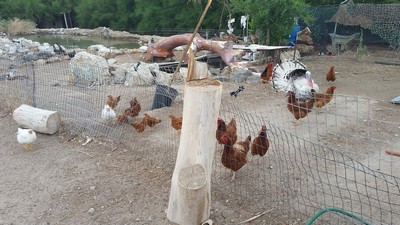
A big part of me was bummed that these broiler chickens were just as sweet, funny, and cute as the others; I was hoping somehow I would love them less so it wasn't as hard, although that simply didn't happen.
When it came time to actually harvest the birds, we set everything up to make it as efficient as possible. We sharpened the machete to make sure we would have a quick, clean, ethical kill. I walked over to the birds and picked them up, petting them, and feeding them meal worms as treats as I took them over to a pen so they would remain calm, showing them love even up to the last seconds. We set up the filet knives, placed a garbage bag in a bucket, and started boiling water to loosen the feathers for plucking.
The actual process of killing the chicken didn't fill me with as much sadness as I expected, but instead I felt an immense amount of gratitude and love for this animal come over me. Because of this animal, we were going to be able to feed our bodies with organic, delicious protein for meals to come.
I strongly believe animal protein is an important part in our diets; I was vegetarian and vegan for 4.5 years when I was younger. I do not believe a vegan lifestyle is sustainable for me; even with the proper supplements and substitutions, I was not healthy. I know how important it is with my active lifestyle for me to consume protein. What better way to sustain my body than with animals who have lived happy lives? I've known these animals and raised them tenderly, not picked out my packaged, shrink-wrapped chicken at the supermarket that came from who-knows-where and live who-knows-how.
Another reason I enjoy hunting, fishing, and harvesting my own food and knowing that they were either wild or knowing how they were raised, is exposure to antibiotics is limited or even altogether removed. The overuse of antibiotics in our society is a cause for concern and scientists believe is putting us at risk of serious and difficult-to-treat infections.
The CDC acknowledges this and says, "Antibiotics must be used judiciously in humans and animals because both uses contribute to the emergence, persistence, and spread of resistant bacteria. Resistant bacteria in food-producing animals are of particular concern. Food animals serve as a reservoir of resistant pathogens and resistance mechanisms that can directly or indirectly result in antibiotic resistant infections in humans." "Antibiotic Use in Food-Producing Animals." National Antimicrobial Resistance Monitoring System for Enteric Bacteria (NARMS). Centers for Disease Control and Prevention, 4 Sept. 2014. Web. 13 June 2016.
While the FDA recommends that antibiotics are only used in animals to address health needs, our own medical doctors overprescribe the use of antibiotics. The majority of the time we don't know what went into the animals we eat. You don't know what you can't see.
The reality of this all is the process of raising and harvesting (or hunting and fishing) for food makes me happy. This makes me feel accomplished. This makes me feel at peace. I do not find joy in the killing, but I understand that eating meat is a necessary part of my life, so it's better to do it myself where I know I can do it the best possible way for every creature involved.
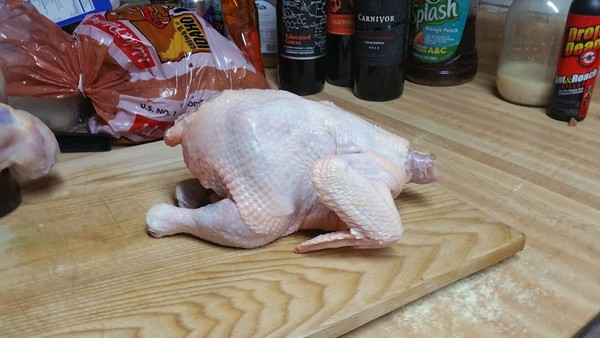
This process is not for everyone. Some people cannot stomach doing it themselves so they prefer to buy their meat from the grocery store. However, for those of you who are interested in fishing, hunting, or raising your own animals for food, I can promise you it is an extremely humbling and incredibly rewarding experience.
Connect with Me Facebook: Rachel Von Fleck Instagram: @vonfleck


